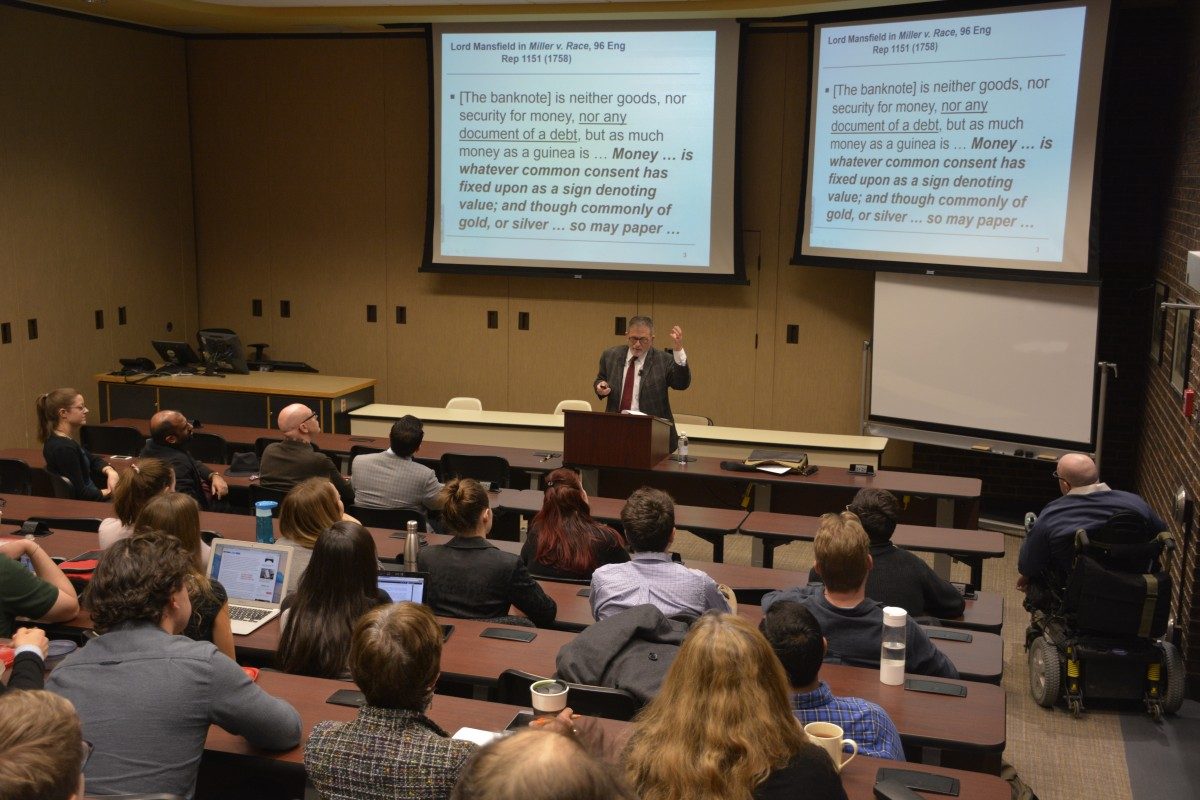
Bitcoin: a lawless frontier or the future of money?
Bitcoin: a lawless frontier or the future of money?
Distinguished Visitors Lecture Series guest Dr. Benjamin Geva explains: “Money and Payments Digitization: Evolution, Revolution and the Law”
Osgoode Hall Law School Professor Dr. Benjamin Geva gave the first Distinguished Visitors Lecture of 2018 at Robson Hall on January 18, shedding light on the confusing and elusive topic of Digital Currencies in his talk, “Money and Payments Digitization: Evolution, Revolution and the Law.”
Dr. Geva specializes in commercial, financial and banking law, particularly in payment and credit instruments, fund transfers, electronic banking, central banking, and the regulation of the payment system. He obtained his LLB (cum laude) at the Hebrew University of Jerusalem (1970) and his LLM and SJD at Harvard, and was admitted to the Ontario Bar in 1982. He has been on the Osgoode faculty since 1977. He practised with Blake, Cassels and Graydon in Toronto and is now counsel with Torys where he is a member of the Payments and Cards Practice Group.
Beginning with definitions of legal tender and a basic history of money (“that which passes freely from hand to hand throughout the community in final discharge of debts and full payment for commodities, [etc.]” – Darling, J. in Moss v Hancock ([1899] 2 QB 111, England), Dr. Geva took students and faculty members from the Bronze Age to the Digital Age in the space of less than an hour. He set out the original purpose, concepts and laws governing money in order to explain the new constructs surrounding the newly emerging digital schemes.
The key points to understand about the law surrounding crypto-currencies such as Bitcoin, Dr. Geva explained, are that 1. It no longer involves a third party such as a central bank run by a country, but rather operates on a block chain Peer-to-Peer bases (P2P); 2. Math, or a secure encryption protects the bitcoin rather than the walls of a bank that historically protected gold or bundles of paper money; 3. They may become vulnerable to hacking, leadership corruption, and value instability among other downsides.
These “are mathematical creatures,” said Dr. Geva, which “hinge on cryptographic algorithms” and protect against hacking and control the creation of new units. The new definition of this kind of money – this digital coin, is “a claim against a specified measure of a defined tradable asset.”
While Dr. Saifedean Ammous, an expert on cryptocurrencies, takes the position that Bitcoin “may be the best store of value humanity has invented,” Dr. Geva shares his skepticism as to a universal decentralized payment system and expressed concerns about the downsides to Bitcoin including that its production would be exhausted by 2140, that it has poor scalability, and that the hidden wealth that comes with possessing Bitcoin poses a risk to society. One final comment he made was, “it is a brilliant idea but for what purpose?”
The bottom line with crypto-currencies is that not enough is known and the field is wide open to further legal research. At the same time there is a future to schemes giving the public direct access to account balances on the books of or backed by central banks as well as to centralized schemes of ‘central bank digital currency’ (CBDC) as substitutes to physical cash.






